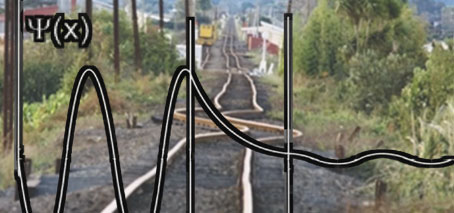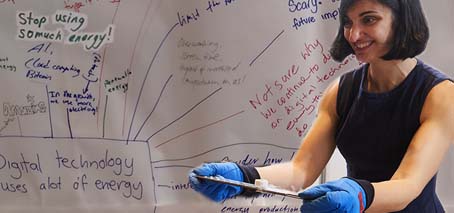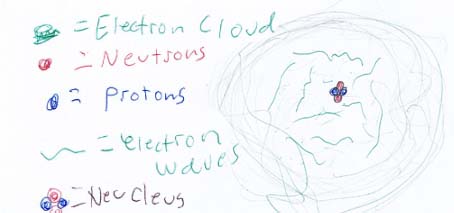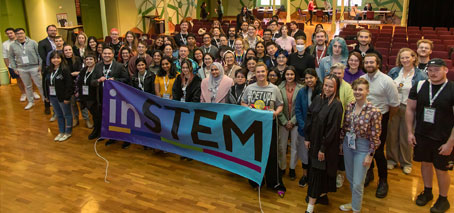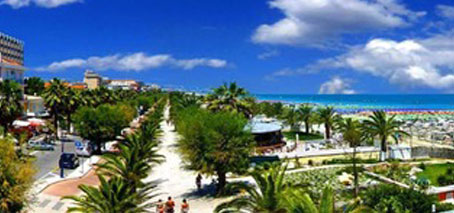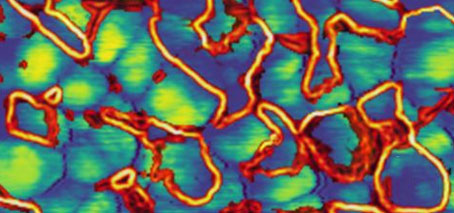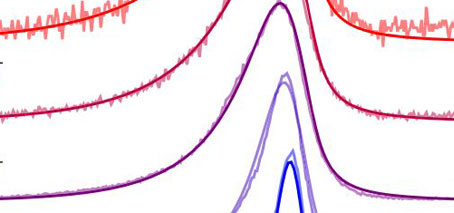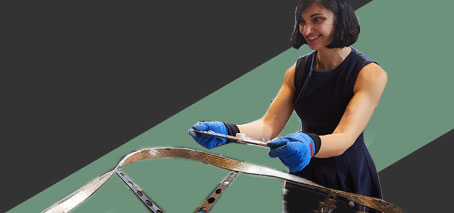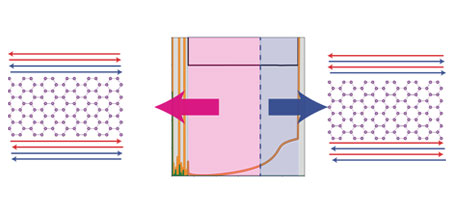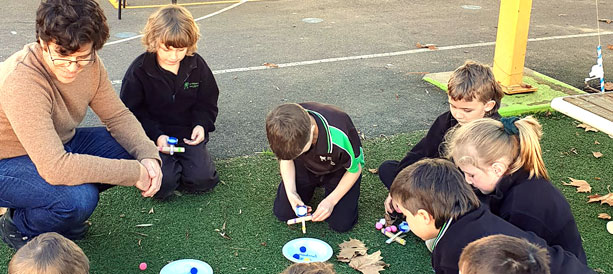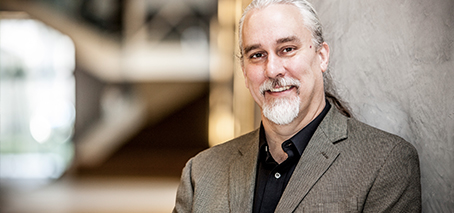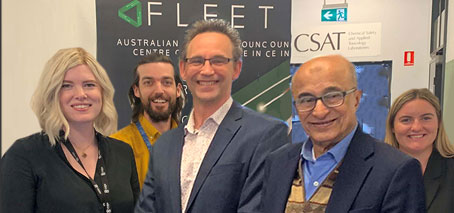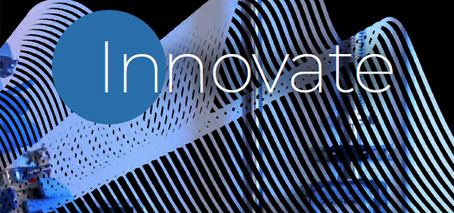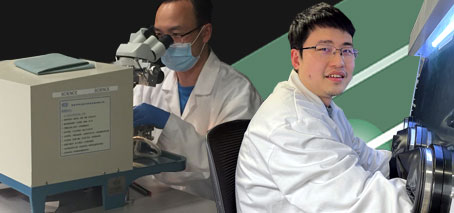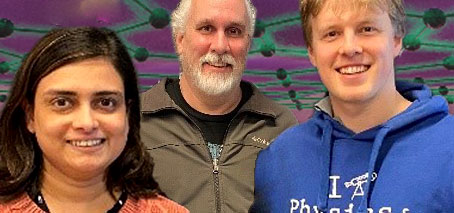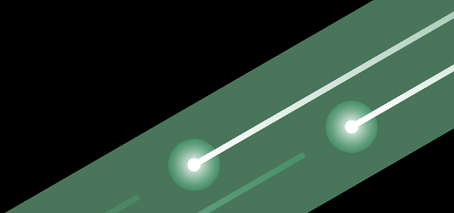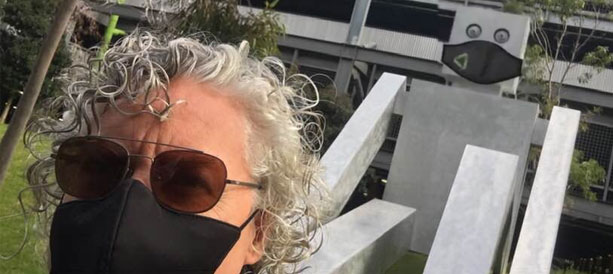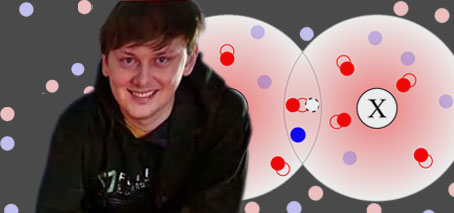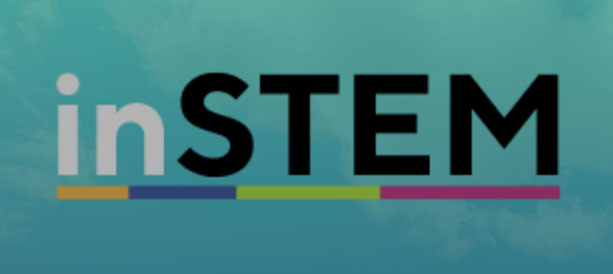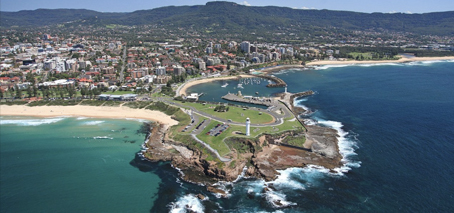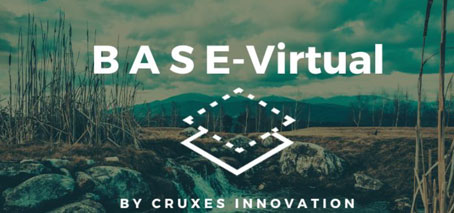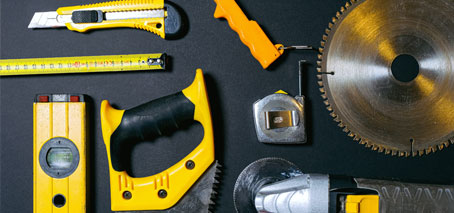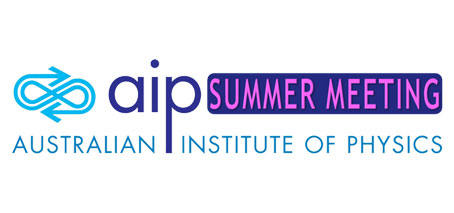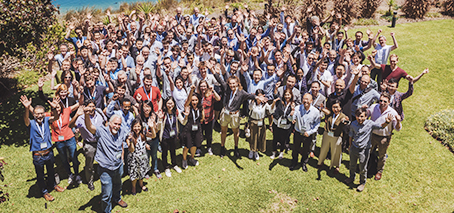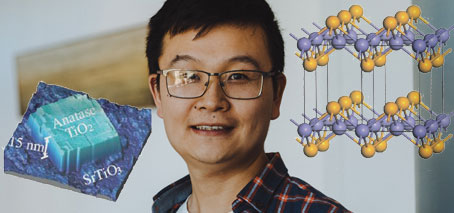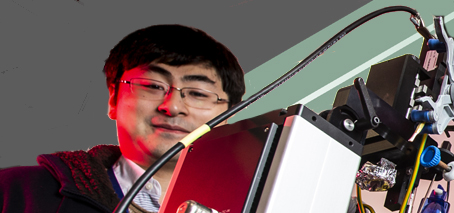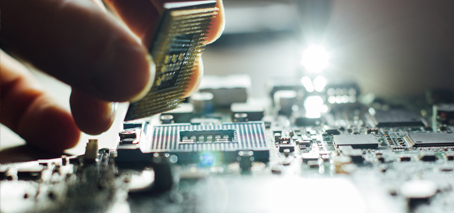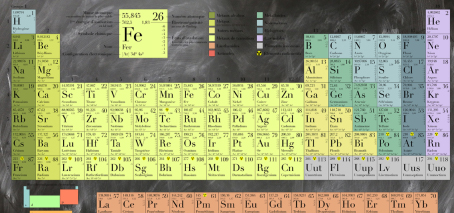Utilising quantum-tunnelling for a robust, highly sensitive, inexpensive new seismometer Around 500 major earthquakes have killed over 400,000 people in the 21st Century, disproportionately in developing nationals, and around the famous ‘ring of fire’. You cannot do anything to prevent an earthquake. But if you can detect them sufficiently early, you can act, to save lives. This is possible because …
Where are they now? Oliver Paull
Oliver Paull was one of the original cohort of FLEET PhD students when the Centre was launched in 2017. We interviewed Oliver about his career path after leaving FLEET (Oliver completed his PhD in July 2022), and how he has used his technical and collaboration training at FLEET in his new position as a postdoc at Unité Mixte de Physique, …
Levitating superconductor and the desire for a socially-responsible digital future
Sparking new understanding at the Sydney Science Trail With 1800+ students and members of the public coming through the Sydney Science Trail Expo in 2023, FLEET’s stall was well positioned to engage minds with the Centre’s key mission challenge of unsustainable digital energy consumption. The levitating superconductor may have been the initial attraction, but the main impact of FLEET’s presence …
Why teach primary students quantum physics?
Widening the reach of quantum teaching towards a ‘quantum savvy’ Australia In 2023 FLEET developed a hands-on workshop to engage primary school students with quantum physics, talking about how electricity and circuits work at the quantum level. Primary students can learn quantum physics, so why not teach it? Pre- and postworkshop evaluation activities embedded in the nine quantum circuit workshops …
Evaluating the impact of equity initiatives: Women in Leadership
FLEET has provided an environment for early-career women to thrive, progress and grow into capable and confident leaders A significant cohort of women at FLEET received funding (2019–23) towards high-level leadership training, with surveys of the recipients in 2023 confirming the lasting positive impacts of this training in their new careers. The leadership program works towards two of FLEET’s major …
Advanced Strategic Capabilities Accelerator (ASCA)
Advanced Strategic Capabilities Accelerator (ASCA) is a newly formed agency that connects and streamlines Defence innovation, science and technology systems, driving capability development and acquisition pathways. ASCA replaces the Defence Innovation Hub and Next Generation Technologies Fund, which the Defence Strategic Review identified are no longer fit for purpose in Australia’s current strategic environment. ASCA has $4.2b to deploy over the next …
inSTEM 2023 : addressing disability, chronic illness & mental ill-health
The second inSTEM conference took place in Melbourne, 19–21 September 2023, at RMIT’s iconic Storey Hall. (Story by EQUS Communications & Engagement Manager, Dr Kristen Harley) inSTEM is a networking and career development conference for people from marginalised or underrepresented groups in STEM, and their allies. Originally developed by ARC Centre of Excellence for Engineered Quantum Systems (EQUS)’ EQUIP committee, …
Advancing Aus-Europe exciton physics links
The FLEET-EU 2023 Conference : Transport in exciton condensates and exciton insulators took place on September 11, 2023 in San Benedetto del Tronto, the art-deco resort town known as the Riviera of the Palms situated on the Italian Adriatic coast. The conference was jointly organised by University of Camerino (Italy), University of Antwerp (Belgium), and FLEET, and covered a range …
Novel approach to advanced electronics, data storage with ferroelectricity
Published first at Flinders University Latest research from Flinders University and UNSW Sydney, published in the American Chemical Society ACS Nano journal, explores switchable polarization in a new class of silicon compatible metal oxides and paves the way for the development of advanced devices including high-density data storage, ultra low energy electronics, and flexible energy harvesting and wearable devices. The …
Solving quantum mysteries: New insights into 2D semiconductor physics
Researchers from Monash University have unlocked fresh insights into the behaviour of quantum impurities within materials. The new, international theoretical study introduces a novel approach known as the ‘quantum virial expansion,’ offering a powerful tool to uncover the complex quantum interactions in two-dimensional semiconductors. This breakthrough holds potential to reshape our understanding of complex quantum systems and unlock exciting future …
Levitating superconductor and the desire for a socially responsible digital future
The public’s awe of FLEET’s levitating superconductor and engaging dialogue with FLEET at the 2023 Sydney Science Trail enabled a shift in public understanding about how society uses digital technology and a call for a socially responsible digital future. FLEET was one of more than 20 science organisations engaging audiences with interactive exhibits at the Sydney Science Trail Expo, developed …
‘Topological gardening’ to achieve unexpected spin transport
‘Trimming’ the edge-states of a topological insulator yields a new class of material featuring unconventional ‘two way’ edge transport in a new theoretical study from Monash University, Australia. The new material, a topological crystalline insulator (TCI) forms a promising addition to the family of topological materials and significantly broadens the scope of materials with topologically nontrivial properties. Its distinctive reliance …
Quantum at FLEET
Everything ‘quantum’ at the ARC Centre of Excellence in Future Low-Energy Electronics Technologies FLEET’s research is intimately wrapped up in quantum science, spanning areas including quantum materials, quantum coherence, quantum entanglement, electronics, semiconductors, materials science, electronic devices and quantum education. FLEET is exploiting new quantum phenomena to build new devices and technologies capable of vastly lowering the energy used in …
Getting wavy: New FLEET Schools Forces and Energy resource goes from Newton to Einstein
Learning about ‘wavy’ stuff you can’t see, smell, taste or touch can test students’ intuitive understanding of the world. FLEET’s latest Forces and Energy teacher resource examines energy from the physics of Newton to Einstein, to the wavy behaviour of sub-atomic particles such as electrons. Students learn how energy is crucial to our understanding of how everything in the universe …
Open access publishing
Opportunities to publish in a range of open access journals without incurring the additional fees is now possible thanks to an agreement negotiated by the Council of Australian University Librarians (CAUL) whereby article processing charges are not incurred by the author. All seven FLEET node universities have signed up to the agreement and participating publishers/journals can be found on the …
FLEET Director elected Fellow of the Australian Academy of Science
Leading materials physicist and FLEET Director Prof Michael Fuhrer has been recognised for his contributions to science, elected a Fellow of the Australian Academy of Science. Professor Fuhrer is one of 20 researchers elected as Fellow of the Australian Academy of Science, announced today. Prof Michael Fuhrer is an international leader in study of the electronic properties of 2D and …
Protected: Hosting the Bangladesh chief energy advisor at UNSW
There is no excerpt because this is a protected post.
New CI Torben Daeneke
FLEET is pleased to announce that Dr Torben Daeneke is now a Chief Investigator in FLEET. As a Scientific Associate Investigator in FLEET (RMIT node) since the outset of the Centre, Torben and has been a prodigious contributor to FLEET’s research effort as well as FLEET’s governance. “I welcome the opportunity to become a FLEET Chief Investigator,” says Torben. “I …
FLEET is pursuing the following research themes to develop systems in which electrical current can flow with near-zero resistance: Topological materials Exciton superfluids Light-transformed materials The above approaches are enabled by the following technologies: Atomically-thin materials Nanodevice fabrication FLEET’s approach is multidisciplinary, combining efforts across condensed-matter, cold-atom physics, material science and nanofabrication. FLEET will: Develop and progress new concepts for …
Destroying the superconductivity in a kagome metal
Electrically controlled superconductor-to-“failed insulator” transition, and giant anomalous Hall effect in the kagome metal CsV3Sb5 A new RMIT-led international collaboration published in February has uncovered, for the first time, a distinct disorder-driven bosonic superconductor-insulator transition. The discovery outlines a global picture of the giant anomalous Hall effect and reveals its correlation with the unconventional charge density wave in the AV3Sb5 …
Leadership training
Four FLEET researchers have received partial Centre funding to attend Women & Leadership Australia Impact program: PhD student Bianca Rae Fabricante (ANU) PhD student Patjaree Aukarasereenont (RMIT) Diversity in FLEET fellow Dr Mengting Zhao (Monash) Research Fellow Dr Amelia Dominguez (Monash) “FLEET’s strategic priorities include developing the next generation of science leaders, and fostering equity and diversity in STEM,” says …
FLEET Early Career Researchers’ working group
A shield for 2D materials that adds vibrations to reduce vibration problems
Ultra-thin, liquid-metal-printed oxide can improve performance of your transistor by suppressing vibrational resistance Counterintuitively, this occurs by adding extra phonons (vibrations) into the system This oxide can protect your transistor against further processing Monash University researchers have demonstrated a new, counterintuitive way to protect atomically-thin electronics – adding vibrations, to reduce vibrations. By ‘squeezing’ a thin droplet of liquid gallium, …
Protected: Discovery and facilities: $5.3m funding
There is no excerpt because this is a protected post.
Covid-safety plan
If you’re still anxious being around so many people, we hear you. We’ll be doing what we can to make everyone as safe as possible. You might consider doing a RAT for the safety of your colleagues (and, the reassurance of any who might be particularly apprehensive), both before the conference and each day. If you feel ill at any …
Submission to the National Quantum Strategy: proposed framework
FLEET has made the following submission towards the proposed framework of Australia’s National Quantum Strategy. See Consultation Paper. The ARC Centre of Excellence in Future Low-Energy Electronics Technologies (FLEET; fleet.org.au) is a collaboration between Monash University, Australian National University, University of New South Wales, University of Queensland, RMIT, Swinburne University of Technology, and University of Wollongong, comprising around 200 leading …
A drop in the sea of electrons: Understanding Fermi polarons and their interactions
Multidimensional coherent spectroscopy (MDCS) on monolayer WS2 reveals Fermi polaron interactions Phase-space filling drives new optical selection rules, where excitons compete for the same electron Identification of a novel, cooperatively-bound exciton-exciton-electron state Recent Australian-led research has provided a world’s first measurement of interactions between Fermi polarons in an atomically-thin 2D semiconductor, using ultrafast spectroscopy capable of probing complex quantum materials. …
Protected: Rural schools outreach
There is no excerpt because this is a protected post.
inSTEM
Connect with other scientists from marginalised or underrepresented groups. Develop your professional networks, build your networking skills, and learn strategies supporting personal career development. Discuss strategies to improve Australia’s scientific diversity: increasing access, retention and success for diverse groups. The inSTEM networking and career-development conference (20-21 July) in Brisbane will bring together people from many marginalised or underrepresented groups in …
Covid-safety plan
FLEET Satellite Meeting / FLEET annual workshop These are FLEET’s first major ‘in person’ events since the pandemic. If you’re feeling anxious being around so many people for the first time in 2 years, we hear you. We’ll be doing what we can to make everyone as safe as possible. RATs / shaking hands / masks / distancing / if …
Things to do in Wollongong
Sights and sounds about 5-15 minutes walk from the Novotel/Conference Venue. By David Cortie (local) Further suggestions welcome! Email to David or Errol Wollongong small boat harbour: Leaving Novotel, head straight to the Ocean, then strong South along the beachfront cycling track past coffee shops etc, after ~ 10 minutes will reach the scenic small boat harbour which has safe …
FLEET code of conduct
This code provides a clear statement of the Centre’s expectations of its members in respect of their professional and personal conduct. This Code applies to all FLEET members, however, the Code of Conduct of a member’s University or organisation overrides this document if there is a conflict. Statement of FLEET Values, Culture, and Behaviour Expectations The following values, culture and …
FLEET legacy: ensuring ongoing impact
FLEET’s legacy will be measured by: Increased understanding of quantum materials and electronic devices, and new concepts for low-energy electronics at the frontier of science The next generation of science leaders, trained in the electronics of tomorrow A capacity for quantum materials and electronic devices research in Australia Strong links to international excellence, and ongoing partnerships between industry, academia and …
A message from Oleh Klochan
FLEET has a number of members from Ukraine and neighbouring countries, and our thoughts are with all of them right now. Our own Oleh Klochan grew up in Ukraine, and his family are there now. We asked Oleh about his family. “Regarding what I have told you over the phone, I am directly affected by this war as all my …
Research-impact training in 2021
Who would be interested in / benefit from my research? How can I pursue high-impact research? FLEET put nine Centre members through a research-impact training program in 2021 on Cruxes Innovation’s Base program, also gaining a wider appreciation of research translation, how to kick off the industry-engagement process, and how to most effectively ‘sell’ the value of their research, whether …
Protected: FLEET’s mid-term review 2021
There is no excerpt because this is a protected post.
Protected: FLEET Sustainability Plan
There is no excerpt because this is a protected post.
Vote Best Poster – Wednesday
People’s Choice Award for Best Poster: Vote for YOUR CHOICE of Best Poster for the Wednesday 16 Dec poster session at the FLEET2021 workshop at the link below. Please copy the link and open it from your browser. https://PollEv.com/multiple_choice_polls/8pw4qLvMp5kI4dfElCX0O/respond There are three awards in total for the three poster presentations.
Vote Best Poster – Tuesday
People’s Choice Award for Best Poster: Vote for YOUR CHOICE of Best Poster for the Tuesday 14 Dec poster session at the FLEET2021 workshop at the link below. Please copy the link and open it from your browser. https://PollEv.com/multiple_choice_polls/zsp8WA6KH7T7EkwM4aBFE/respond There are three awards in total for the three poster presentations.
Vote Best Poster – Monday
People’s Choice Award for Best Poster: Vote for YOUR CHOICE of Best Poster for the Monday 13 Dec poster session at the FLEET2021 workshop at the link below. Please copy the link and open it from your browser. https://pollev.com/multiple_choice_polls/sKPgecDuSNIA1KPlzPezY/respond There are three awards in total for the three poster presentations.
Outreach with impact
Qualitative and quantitative surveying confirm the impact of FLEET outreach efforts FLEET’s public and schools outreach seek to promote public awareness and literacy of FLEET science, contributing to public scientific literacy, raising and understanding of FLEET science among students and teachers, and improving public awareness of FLEET (and adjacent) areas of research. But how do we know if we are …
Igniting the spark for learning: Building a better understanding of electricity and atomic structure
Evaluating student knowledge and learnings on electricity A cooperative FLEET project with Ashburton Primary School in SE Melbourne is teaching students to think about atoms, electricity, conductors and insulators. A pilot workshop with eighty-five students tested success in developing year-5 and 6s’ understanding of these areas, enabling critical thinking about applications of electricity and the value of research such as …
survey
A comprehensive FLEET membership survey was conducted between 15 Feb and 3 Mar 2021 to gather feedback from FLEET students, postdocs, investigators as well as FLEET alums. Responses from 55% of membership has offered us strong insights into what works and what doesn’t in six different areas of Centre operations and initiatives. Huge thanks to everyone participated for your time …
Peeking into the tool shed at UNSW: FLEET scientists introduce their favourite equipment
A new series of explainer videos produced by the FLEET’s team at UNSW introduces some of the most-useful tools in novel materials synthesis and study. The series of videos, produced by FLEET and UNSW scientists, briefly introduces key tools and techniques used to create materials used in the search for a new generation of future, low-energy electronics. “Our researchers at …
meeting
Around the world, millions of people have bought into the idea that three minutes is all it takes to meet a potential partner! Can the same be true in science? Objective: To allow FLEET members, particularly ECRs to interact with a broader cross-section of members from other nodes, in a quick and fun format. Grab a cup of coffee or …
AIP Summer Meeting December 2021
“Bring your physics to the AIP Summer Meeting!” That’s the message from FLEET’s Iolanda Di Bernardo (Monash) and Dongchen Qi (QUT), who are on the organising committee for this year’s event. Abstract submissions are now open, with the Australian Institute of Physics (AIP) Summer Meeting running 6–9 December 2021 at the Queensland University of Technology (QUT) in Brisbane. The AIP Summer …
Australian Neutron Scattering Symposium November 2020
http://anbug.net/aanss2020 This conference covers a range of topics, and there is plenty of overlap with FLEET research, particularly in the session on Magnetism and Condensed Matter. FLEET is sponsoring the gold package which includes six complimentary student registrations – contact David Cortie for details. A few highlights from the program, including some FLEET members: Oleg Shushkov (UNSW): Infrared catastrophe in …
FLEET workshop code of conduct
Whether the FLEET event is in-person or online, it is always important that we conduct ourselves professionally, with due respect to our colleagues. All attendees and speakers at our conference are required to agree with the following code of conduct. Organisers will enforce this code throughout the event. We expect cooperation from all participants to help ensure a safe environment …
Interfaces the key in atomically-thin, ‘high temperature’ superconductors
An international FLEET collaboration publishing a review of atomically-thin ‘high temperature’ superconductors finds that each has a common driving mechanism: interfaces. The team, including researchers from the University of Wollongong, Monash University and Tsinghua University (Beijing), found that interfaces between materials were the key to superconductivity in all systems examined. The enhancement of superconductivity at interfaces (interface superconductivity enhancement effect) …
How To FLEET
Unsure how to navigate the FLEET intranet and member portal? Not to worry! we will show you how in less than 30 seconds! FLEET intranet How can I access the intranet? Go to fleet.org.au/intranet and use your member login details provided. Show me. What’s on the intranet dashboard? How do I access the FLEET centre induction package? Where is the Centre …
AAS 2021 awards
Nominations are open for the Australian Academy of Science 2020-21 awards, including the following awards of interest to FLEET researchers and networks: David Craig Medal and Lecture – chemical research (career) Le Fèvre Medal – chemical research <10 years post-PhD Matthew Flinders Medal and Lecture – physical science, nominations via Academy Fellows (career) Nancy Millis Medal – women, physical science, 8-15 years …
Things to do around Lorne
We are very excited to have more than 30 family members joining us this year, including 13 children in childcare. Families and partners may like to seek each other out to coordinate activities during the day. We’re happy to take suggestions on how we can help facilitate this. Stuff to do in and around Lorne includes: Walks around town including …
FLEET annual workshop 2019 code of conduct
All attendees, speakers, sponsors and volunteers at our conference are required to agree with the following code of conduct. Organisers will enforce this code throughout the event. We expect cooperation from all participants to help ensure a safe environment for everybody. We will provide a respectful and harassment-free experience for everyone, regardless of gender, gender-identity, age, sexual orientation, disability, physical …
Discovery of ‘super-fluid like’ effect of penetration through porous materials in Liquid metals at room temperature
Researchers from the University of Wollongong, Australia have made the startling discovery that room-temperature liquid metals show a “superfluid-like” effect – passing through porous materials. The effect is made possible through the reduction of surface tension to a near-zero state by applying a voltage on the liquid metal in a solution. Their findings offer new opportunities for microfluidic applications and …
FLEET collaborating nodes
FLEET is a collaboration of over 100 universities at seven Australian universities and 18 Australian and international scientific institutions. FLEET’s seven participating Australian university nodes are in Canberra, Melbourne, Sydney, Wollongong and Brisbane.: Australian National University, Canberra Monash University, Melbourne RMIT University, Melbourne Swinburne University of Technology, Melbourne UNSW, Sydney University of Wollongong University of Queensland, Brisbane Australian National University …
Explainer: spintronics
Spintronic devices use a quantum property known as ‘spin’, in addition to the electronic ‘charge‘ used in conventional electronics. This vastly increases the computing power of a device, via a deceptively simple piece of maths… A single ‘bit’ of a conventional device can take two states: represented as 0 and 1. The computing power of conventional electronics thus increases by …
Vortex story resources
Resources for the story: Order from chaos: Australian vortex studies are first proof of decades-old theory Resources Videos Kris Helmerson (Monash) ultra-cold physics Kris and Shaun: 2D vortices (zero-graphics and no-caption options are also available) University of Queensland: paddle-stirred vortices Shaun Johnstone (Monash): Negative absolute temperature Future solutions to computation energy use Images Bose Einstein Condensate lab at Monash University …
FLEET Advisory Committee: Report
Summary The FLEET Advisory Committee (AC) is impressed with the performance and achievements of FLEET to date. While the focus of the meeting was on management advice, the scientific themes and approaches within FLEET are well structured and the Centre is showing signs of strong scientific results with some high impact publications at, or soon after, the time of the …
Protected: First observation of anisotropic polariton propagation along surface of natural vdW material
There is no excerpt because this is a protected post.
Protected: Explainer: Quantum (anomalous) Hall effect (QHE and QAHE) DRAFT
There is no excerpt because this is a protected post.
Explainer: Energy use by Bitcoin underlines the ICT energy challenge
Recent events have reinforced the urgency of FLEET’s mission, with the dramatic rise of Bitcoin introducing the public to the notion that computing is a limited resource, and that the energy used in computation has become significant. Bitcoin relies on the creation of new blocks in a blockchain, a computationally-intensive process by design. The profitable creation or “mining” of new …
Protected: Explainer: topological insulators DRAFT
There is no excerpt because this is a protected post.
Protected: Explainer: topology DRAFT
There is no excerpt because this is a protected post.
Protected: Explainer: band gap DRAFT
There is no excerpt because this is a protected post.
Protected: Explainer: elements of interest DRAFT
There is no excerpt because this is a protected post.
Book a FLEET science show
The FLEET science show is designed to inspire a love of science in school students and the wider community. The program brings working scientists into the classroom to answer students’ questions face to face. The collection of fun science demonstrations also work equally well at public events or in public areas. If you or your school or public event would …
Protected: testing tahi rua toru wha
There is no excerpt because this is a protected post.
Annual workshop images
Click for presentation videos
Explainer: why use 2D atomically-thin materials
Why does FLEET use atomically-thin, 2D materials? FLEET uses materials that are just one layer of atoms in thickness, referred to as being ‘atomically thin.’ Such materials are also known as ‘two dimensional’ (2D), as opposed to three dimensional. Quantum effects become much more significant when the freedom of charge carriers is restricted to only two dimensions (relative to their …
Challenges of demonstrating new science
DRAFT article by Errol Working at atomic and subatomic levels provides a major challenge for the task of communicating FLEET research Such unimaginably small scales make it difficult for an audience (whether adult or younger) to directly visualise the mechanisms at work. FLEET will create resources, such as animation, models and displays, to help explain these concepts. Negotiations with ScienceWorks …
FLEET social media policy
FLEET encourages members using social media to connect with each other and with broader community of researchers, colleagues, potential business partners, and others in related fields. We encourage you to associate yourself with FLEET, with your research, with others working in your field and with physics and science in general. We embrace healthy and honest discussion. Any comments on social …
Guidelines for project updates: FLEET inaugural annual workshop
15 minute project brief (12 min talk + 3 min questions) In this inaugural FLEET workshop, it’s important you pitch your talk so that most of the audience will understand most of the talk. Please bear in mind that the majority of the audience won’t be familiar with your particular field. We have researchers from every Research Theme and Enabling …

